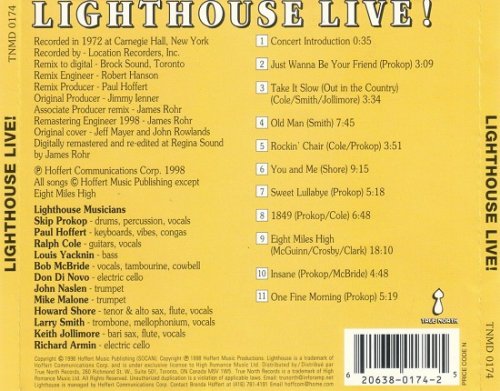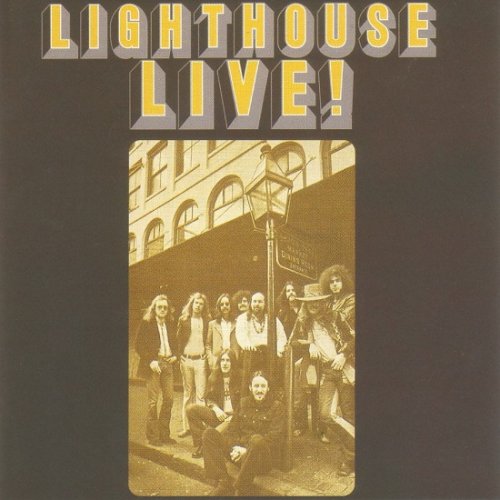
Lighthouse - Lighthouse Live! (Reissue) (1972/1998)
BAND/ARTIST: Lighthouse
- Title: Lighthouse Live!
- Year Of Release: 1972/1998
- Label: True North Records
- Genre: Jazz Rock, Brass Rock
- Quality: Mp3 320 / Flac (tracks, .cue, log)
- Total Time: 01:08:31
- Total Size: 168/450 Mb (scans)
- WebSite: Album Preview

Tracklist:
01. Concert Introduction
02. Just Wanna Be Your Friend
03. Take It Slow (Out in the Country)
04. Old Man
05. Rockin' Chair
06. You and Me
07. Sweet Lullabye
08. 1849
09. Eight Miles High
10. Insane
11. One Fine Morning
Line-up::
Richard Armin/ Electric cello
Ralph Cole / Guitar, Vocals
Don Dinovo / Electric Violina
Paul Hoffert / Vibes, keyboard, congas
Bob McBride / Lead vocals, percussion
John Nalsen / Trumpet
Skip Prokop / Drums, percussion, Vocals
Howard Shore / Sax, Flute, Vocals
Larry Smith / Trombone, Vocals
Louis Yacknin / Bass
Keith Jollimore / Sax
Mike Malone / Trumpet
Canadian brass rock band LIGHTHOUSE were formed in Toronto 1969. Unusually, the band leader Ronn "Skip" Prokop (born 13 December 1946 in Ontario) was a drummer, he has played previously with artists such as Janis Joplin, Carlos Santana and Al Kooper before forming his first band THE PAUPERS. Of these, the Kooper connection is probably the most significant, as the music of Lighthouse is based around a solid brass section and big arrangements, similar to those of BLOOD SWEAT AND TEARS and CHICAGO (TRANSIT AUTHORITY).
Prokop's ambitions were made clear from the outset when the first line up of Lighthouse had no less than 11 members. The were quickly picked up by RCA Victor, who release the bands self titled debut in 1969. Further albums followed quickly, but the punningly titled "Peacing it all together", their third release, would see the end of their relationship with RCA.
The move to GRT records coincided with the recruitment of vocalist Bob McBride, whose contribution to the fourth album "One fine morning" proved to be a commercial turning point for the band. The album spawned the bands first two hit singles, including the striking title track.
Prokop's penchant for jazz/fusion and classical music led to a number of live collaborations with orchestras which, when combined with the band's appearances at a number of high profile pop/rock festivals (they declined an offer to appear at Woodstock though), meant Lighthouse's fortunes continued in the ascendancy. Perhaps realising letting the band go had been a touch premature, RCA quickly put together a compilation of the material they still owned in 1971, in the form of the rather cheekily titled "One fine light" compilation. The following year, the band's first live album, the superb "Lighthouse live" was released, becoming Canada's first platinum selling album.
Singer Bob McBride would leave the band after the release of the "Sunny days" album, a time which in retrospect was the beginning of the end for the band in both commercial and creative terms. Despite the fact that it was on reality his band, Prokop left in 1974 after the next album "Good day". The rest of the band soldiered on for a while, but the soul of the band had gone, and they eventually bowed to the inevitable and split in 1976.
In 1993, the band reunited for a tour and a new album "Song of the ages". The album was not very well received by fans of the band, who felt it failed to capture the magic of the band's glory years.
Bob McBride died from substance abuse in 1998 at the age of 51. The reunited band however continues to tour.
Prokop's ambitions were made clear from the outset when the first line up of Lighthouse had no less than 11 members. The were quickly picked up by RCA Victor, who release the bands self titled debut in 1969. Further albums followed quickly, but the punningly titled "Peacing it all together", their third release, would see the end of their relationship with RCA.
The move to GRT records coincided with the recruitment of vocalist Bob McBride, whose contribution to the fourth album "One fine morning" proved to be a commercial turning point for the band. The album spawned the bands first two hit singles, including the striking title track.
Prokop's penchant for jazz/fusion and classical music led to a number of live collaborations with orchestras which, when combined with the band's appearances at a number of high profile pop/rock festivals (they declined an offer to appear at Woodstock though), meant Lighthouse's fortunes continued in the ascendancy. Perhaps realising letting the band go had been a touch premature, RCA quickly put together a compilation of the material they still owned in 1971, in the form of the rather cheekily titled "One fine light" compilation. The following year, the band's first live album, the superb "Lighthouse live" was released, becoming Canada's first platinum selling album.
Singer Bob McBride would leave the band after the release of the "Sunny days" album, a time which in retrospect was the beginning of the end for the band in both commercial and creative terms. Despite the fact that it was on reality his band, Prokop left in 1974 after the next album "Good day". The rest of the band soldiered on for a while, but the soul of the band had gone, and they eventually bowed to the inevitable and split in 1976.
In 1993, the band reunited for a tour and a new album "Song of the ages". The album was not very well received by fans of the band, who felt it failed to capture the magic of the band's glory years.
Bob McBride died from substance abuse in 1998 at the age of 51. The reunited band however continues to tour.
Oldies | Rock | FLAC / APE | Mp3 | CD-Rip
As a ISRA.CLOUD's PREMIUM member you will have the following benefits:
- Unlimited high speed downloads
- Download directly without waiting time
- Unlimited parallel downloads
- Support for download accelerators
- No advertising
- Resume broken downloads


